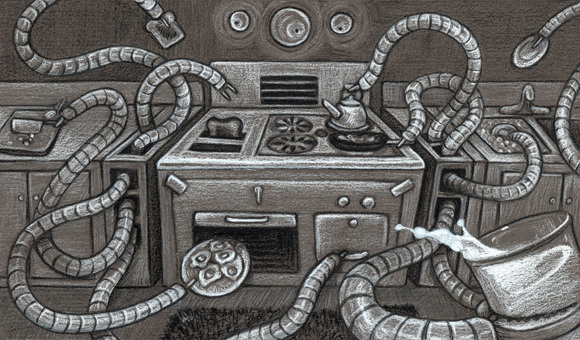Pushmi-pullyu: Payments on the Coming “Internet of Things”
The “Pushmi-pullyu” is, of course, a llama-like character from the Dr. Doolittle books and films — one with heads on either end of its body. But the legendary beast may also be a symbol of how the idea of “payments” are still sorting themselves out on the coming “internet of things.” At least, according to MasterCard CEO Ajay Banga. In comments to the Diginomica website, he said there would be “a lot of “interesting pushing and pulling over time,” as the idea of “payments” — and commerce — sorted themselves out over this expanding new network of wired-up, well, “things.”
The Internet of Things and its Impact
If you’re still unsure of what the “Internet of Things” means, you might consider the classic Ray Bradbury story There Will Come Soft Rains: In it, a “smart house” of the future finally self-destructs, after “living alone” for decades on autopilot, years after actual people have ceased to exist.
But that house — with its automatic temperature controls, food preparation, cleaning abilities, etc., is exactly what that new “internet” is about. Though Visa’s website on “The Internet of Things” imagines more than just houses: “whole cities (will) interact through connected devices. Forecasts show that 50 billion connected devices will reach the market by 2020.”
The Vision of Secure Payments
Visa proclaims themselves busy working with IoT device manufacturers to provide “a path to embed secure payments into their connected devices, enabling anything from a watch to a car to initiate payments. Imagine with just a touch of a button, consumers could pay for gas, food or parking without leaving their connected car.”
MasterCard’s own Chief Innovation Officer, Garry Lyons, says “I think it would be fair to say that we’re living in extremely interesting times. The world is becoming more connected, technology is evolving at a phenomenal pace, industries have been reinvented and consumers have huge expectations about what technology can do for them to remove the friction as they go about their daily lives.”
The Future of Payments
For one thing, aside from a growing expectation that your car may one day pilot itself, there’s the idea that your ‘fridge could tell you you’re out of milk, or salads, and prompt you to order some digitally for either delivery, or pick-up at your local market.
But how will you pay for it? Visa has its “Visa Ready,” ready to go, and Master Card has “Master Pass,” a quicker digital “check out” payment system based on information your bank already has — you won’t have to sign up for it “fresh,” if you want it, but just opt in to the program.
Enabling Secure Payments
Lyons is hoping there will be more and more opting in in the near future: “The Internet of Things is something you have heard from us many, many times before, because we still believe that every connected device is going to be a commerce device. We are going to continue to enable simple and secure payments from every device, whether it’s a phone, whether it’s a tablet, whether it’s a fridge, whether it’s a washing machine, whether it’s a car, we are going to facilitate secure payments from that device.

The Role of Machine Learning
“Machine learning is another very, very interesting area, and given all of the data assets that we have as a company, I’m hoping it will come with no surprise for you that we are already leveraging this technology and have been for some time. We are using it to reduce fraud, to predict behaviours, to enhance our product experiences and generally become more efficient.”
Ensuring Security in the Internet of Things
It may also come as no surprise that “the US Department of Justice (DoJ) has announced the formation of a threat analysis team to oversee the security of the ‘internet of things’ in order to protect national interest from cyberattacks and terrorist threats, reports Reuters.
“Announcing this, Assistant Attorney General John Carlin of DoJ national security division said the objective was not “to be alarmist” but to recognize and address possible security risks from internet-driven technology like medical devices and automated cars.”
Conclusion
So before your washing machine can order more soap, or your smart car can have your shakes and fries waiting at the burger joint ahead at the next highway pullout, the threat of “hackery” is already there.
We will keep you posted on all these developments as we head, imminently, into our near future.
And if you need to take care of payments, security, or anything else in our even nearer future — whether mobile, EMV readiness, or anything else — your AVPS rep is ready.
Washing machines can’t order new soap — yet. But we are certainly here to take your call or email.








